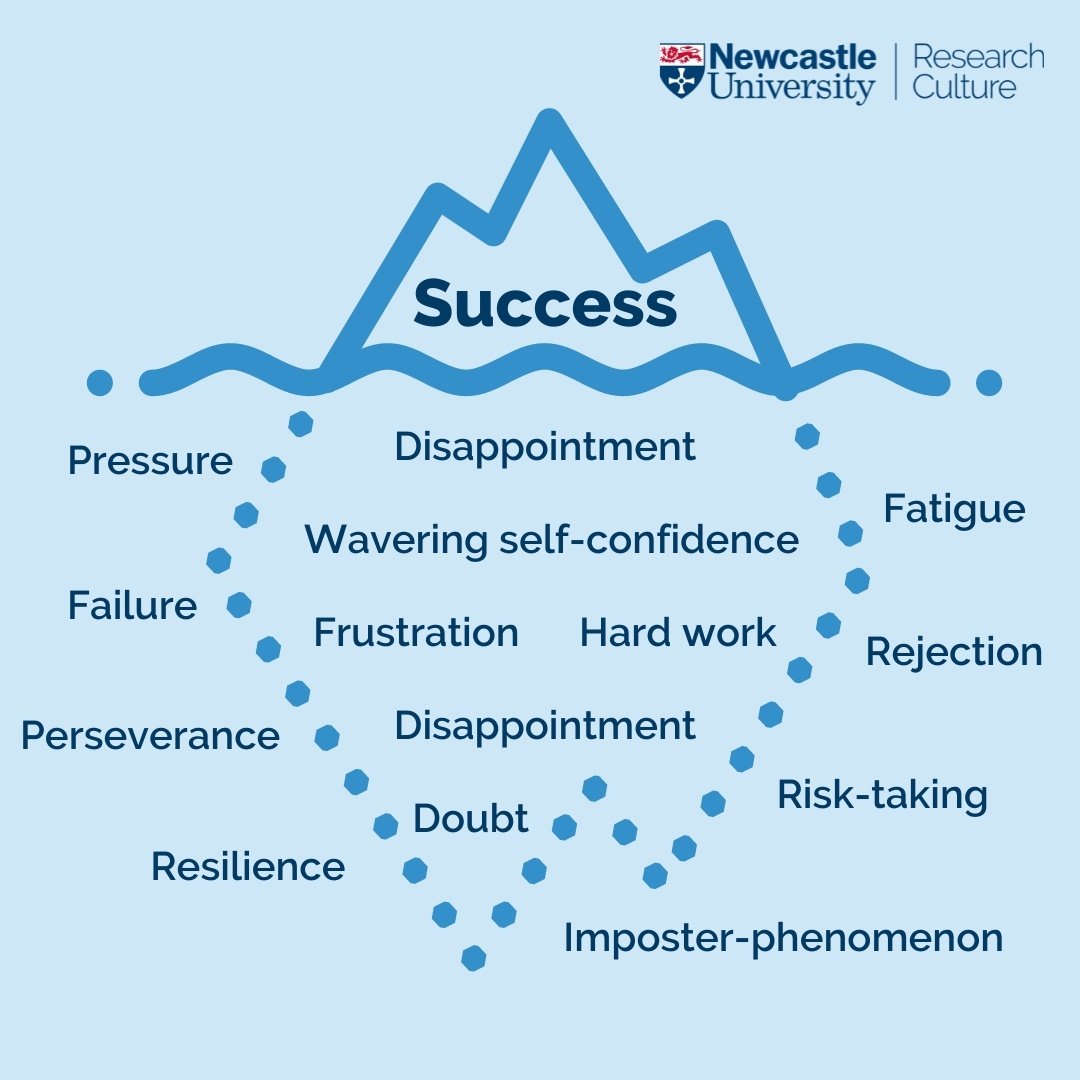How do we destigmatise 'failure' in the research environment?
9 October 2024 | By: Dr Nicola Simcock | 3 min read
In research, failure is often seen as an off-limits subject, something to be hidden or ignored. Some failures are more difficult to handle than others and, understandably, when things go wrong people may be reluctant to discuss it.
Amidst the celebrations of major grant successes, high-impact journal publications, and prestigious fellowships, failure is not always visible in academia. Nicola Simcock, Research Culture Manager at Newcastle University, shares how we’re working to create a research culture that normalises the discussion of failure and recognises it as an essential part of the learning process.
The stigma of failure in academia
Newcastle University’s research community has identified 'failure' and its stigmatisation in the academic environment as a significant issue impacting their research culture. We want this to change.

In the research environment, success often appears as a defining feature. However, there are a range of complexities that underpin success, including failure and rejection. We can do more to bring these hidden elements to the surface, to benefit the entire research community. Graphic inspired by an illustration from Visual Hustles.
Research is the investigation and acquisition of new information and conclusions, an iterative learning process, with failure as an inherent part of that learning. While research successes are rightly celebrated, the setbacks and failures that contribute to those achievements often go unrecognised. By acknowledging failure as an essential part of the learning process we can enhance our research practices and empower our research community.
“…take the feedback you get from failure and actually use that in a positive way. So I think that's really the best thing to do… it's therapeutic to have a rant, but also it's not very productive. You always get something that you learn from a failure. And the most important thing to do is to learn from your failure and use that to move forward and do something else.”
Professor Ian Head, Dean of Research and Innovation, Faculty of Science, Agriculture and Engineering
The impact of unacknowledged failure
Importantly, failure isn’t only an academic issue. Whether it’s publication, promotion, or career progression, every member of the research community (postgraduate researchers, academics, researchers, and professional service colleagues) will inevitably feel failure in some aspect(s) of their work. Not acknowledging failure can have a huge impact.
Newcastle’s Research Funding Development team have observed that a lack of ‘visible’ failure has a detrimental effect on the development of research ideas and the pursuit of funding opportunities. Following a funding rejection, many feel discouraged from progressing their project ideas, too often letting an initial failure diminish the value of their work. This can lead to the loss of good research ideas that may lead to new advances.
Failing Forward
So how do we, as a research community, change this narrative and start normalising the topic of failure? Why not start by talking about it?
Failing Forward is a collaborative project between Newcastle’s Research Funding Development and Research Culture teams. The project aims to confront the topic of failure by showcasing community members sharing their experiences and, importantly, how they deal with failure to help other colleagues and students.
Creating a culture that normalises and embraces ‘failure’ and sees it as a valuable part of learning, is an action in Newcastle’s institutional Research Culture Action Plan. The Failing Forward videos are a starting point toward that goal. While they won’t necessarily change the deeply ingrained ‘culture of success’ that might feel familiar, we hope that they can be used to start a conversation about the realities of failure.
'I think in faculty now, we do have some really good support… who will look at a bid and if it hasn't been successful, play those scenarios out with you… And I think that is helpful, particularly for people in their early career stage where it's the first time or the second time or maybe the third time that you're not alone. It's really important to talk to other people about how to build from there.'
Professor Janice McLaughlin, Professor of Sociology, Geography, Politics and Sociology, Faculty of Humanities and Social Sciences
Diverse perspectives on failure
When conversations about the project began, it was eye-opening to see diverse perspectives from across our research community. For instance, some individuals strongly dislike the term 'failure', viewing it as overly negative and not adequately reflecting the huge effort and energy put into any project that has ultimately been unsuccessful. On the other hand, others actively embrace the term, arguing that it needs to be celebrated as a reflection of all that dedication and effort involved.
To serve our research community, we wanted to reflect the different perspectives through the project and subsequently asked volunteers to openly share their own experiences on video. Interestingly more men than women agreed to take part and this too garnered contrasting responses. Some highlighted the gender bias as a flaw in the work, indicating a strong need for greater sharing of relevant women-focused stories. Conversely, others have praised this outcome, citing that the sharing of failure is rarer from a male perspective and that these videos will help, in part, to redress that balance.
Let’s destigmatise failure together
One thing we can agree on, however, is that we can all do more to help destigmatise failure in the research environment. In October 2024 the research culture team will host a formal launch of the Failing Forward videos, aiming to engage our research community on the topic of failure.
But what more can we do? Who should we primarily be targeting? And how do we translate the positive learnings and sentiment displayed in these videos to genuine change on the ground? As we start to gain more insight about the needs of our research community, we can share this with the sector, and understand what more can be done to address failure on a broader scale.
So, let’s have an open and honest conversation about failure and let’s destigmatise failure in research.
To all those who have failed and will fail in the future, Fail Forward.
Further information
- watch the Failing Forward video series on YouTube
- if you have any feedback about this project please get in touch with Nicola Simcock, Research Culture Manager, Newcastle University: nicola.simcock@ncl.ac.uk
- learn more about how we’re committed to building a welcoming and empowering research culture
- read our Research Culture Action Plan
- find out more about our Equality, Diversity, and Inclusion Toolkit for Researchers
